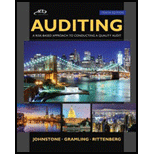
a.
Introduction: External audit is examining the financial statements of an organization independently. This examining is based on certain rules and laws to check the accuracy of the company’s record. This type of audit is independent in nature.
To describe:The role of Congress and in which way it affects external auditing profession.
b.
Introduction: External audit is examining the financial statements of an organization independently. This examining is based on certain rules and laws to check the accuracy of the company’s record. This type of audit is independent in nature.
To describe: The role of PCAOB (Public Accounting Oversight Board) and in which way it affects external auditing profession.
c.
Introduction: External audit is examining the financial statements of an organization independently. This examining is based on certain rules and laws to check the accuracy of the company’s record. This type of audit is independent in nature.
To describe: The role of SEC (Securities and exchange commission) and in which way it affects external auditing profession.
d.
Introduction: External audit is examining the financial statements of an organization independently. This examining is based on certain rules and laws to check the accuracy of the company’s record. This type of audit is independent in nature.
To describe: The role of AICPA (American Institute of Certified Public Accountants) and in which way it affects external auditing profession.
e.
Introduction: External audit is examining the financial statements of an organization independently. This examining is based on certain rules and laws to check the accuracy of the company’s record. This type of audit is independent in nature.
To describe: The role of CAQ (The Centre for Audit Quality) and in which way it affects external auditing profession.
f.
Introduction: External audit is examining the financial statements of an organization independently. This examining is based on certain rules and laws to check the accuracy of the company’s record. This type of audit is independent in nature.
To describe: The role of IAASB (International
g.
Introduction: External audit is examining the financial statements of an organization independently. This examining is based on certain rules and laws to check the accuracy of the company’s record. This type of audit is independent in nature.
To describe: The role of COSO (Committee of Sponsoring Organizations of the Treadway Commission) and in which way it affects external auditing profession.
Want to see the full answer?
Check out a sample textbook solution
Chapter 1 Solutions
Auditing: A Risk Based-Approach to Conducting a Quality Audit
- For the current year ended March 31, Carter Company expects fixed costs of $620,000, a unit variable cost of $72, and a unit selling price of $95. a. Compute the anticipated break-even sales (units). b. Compute the sales (units) required to realize an operating income of $145,000. (Round your answer to nearest units)arrow_forwardWhat is Bobby's 2019 net income using accrual accounting?arrow_forwardPension plan assets were $2,300 million at the beginning of the year and $2,560 million at the end of the year. At the end of the year, retiree benefits paid by the trustee were $60 million and cash invested in the pension fund was $65 million. What was the percentage rate of return on plan assets?arrow_forward
- I need assistance with this financial accounting problem using valid financial procedures.arrow_forwardAccounting problemarrow_forwardRoyal Designs creates custom furniture. During November, it had applied an overhead of $162,000. Overhead is applied at the rate of 80% of direct labor cost. Direct labor wages average $32 per hour. How many direct labor hours did Royal Designs have for the month of November?arrow_forward
 Auditing: A Risk Based-Approach to Conducting a Q...AccountingISBN:9781305080577Author:Karla M Johnstone, Audrey A. Gramling, Larry E. RittenbergPublisher:South-Western College Pub
Auditing: A Risk Based-Approach to Conducting a Q...AccountingISBN:9781305080577Author:Karla M Johnstone, Audrey A. Gramling, Larry E. RittenbergPublisher:South-Western College Pub Auditing: A Risk Based-Approach (MindTap Course L...AccountingISBN:9781337619455Author:Karla M Johnstone, Audrey A. Gramling, Larry E. RittenbergPublisher:Cengage Learning
Auditing: A Risk Based-Approach (MindTap Course L...AccountingISBN:9781337619455Author:Karla M Johnstone, Audrey A. Gramling, Larry E. RittenbergPublisher:Cengage Learning


